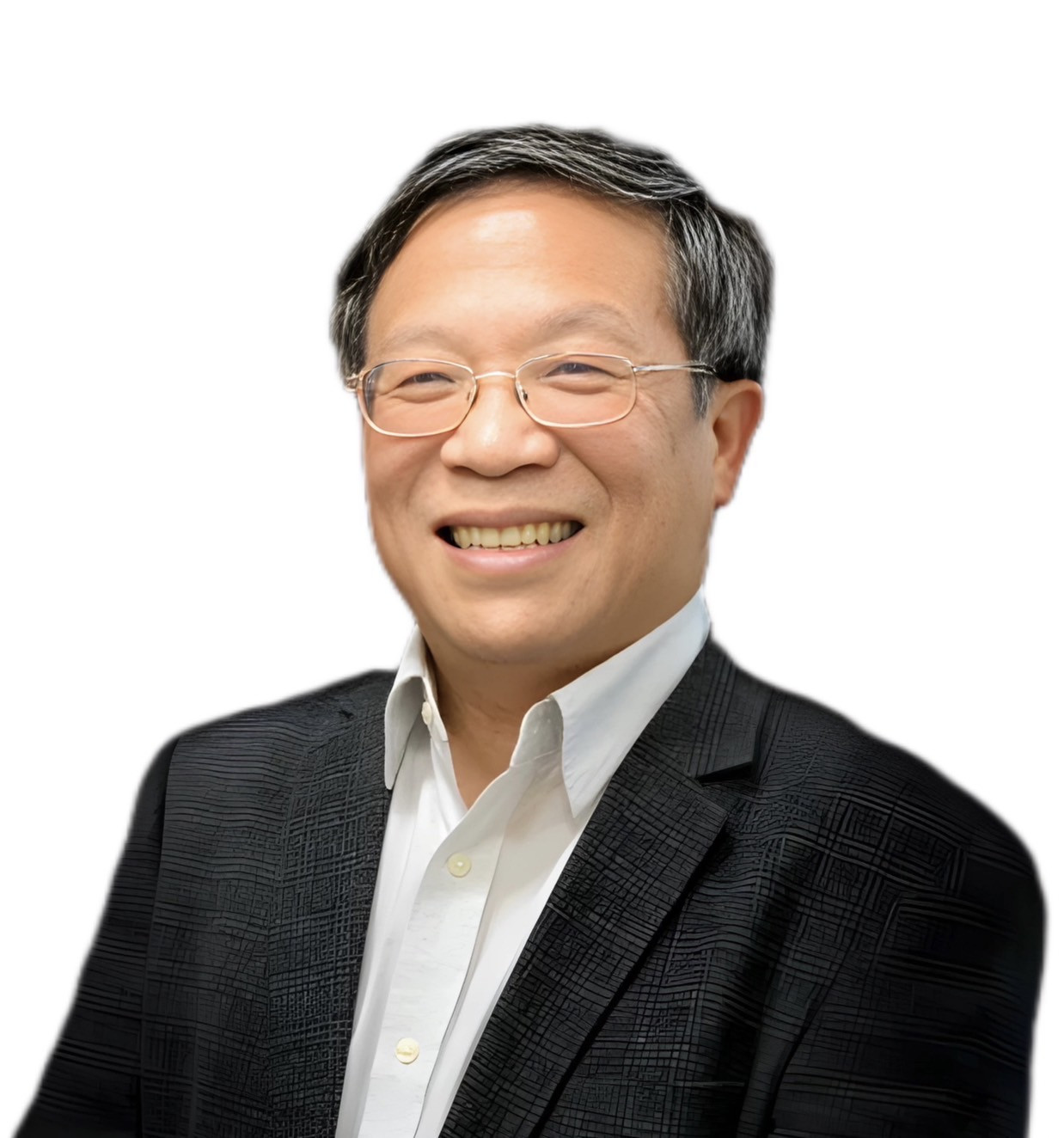第一列
The maturity of quantum algorithms and their applications leads to active and extensive study of potential applications of quantum computing in various fields. This project will apply and develop various quantum algorithms, combining with artificial intelligence and machine learning, to solve basic and industrial biomedical and financial problems. In addition to using quantum computers and quantum-inspired machines, it will also incorporate the integrated technology of hybrid quantum and classical approaches to solve high-complexity problems and to accelerate the quantum computing performance for real-time computing services. The project will integrate experts from different disciplines and focus on practical financial and social issues. Researches will work closely with Taiwan’s industrial, medical and financial institutions to conduct research on both proof-of-concept and solutions for practical problems.
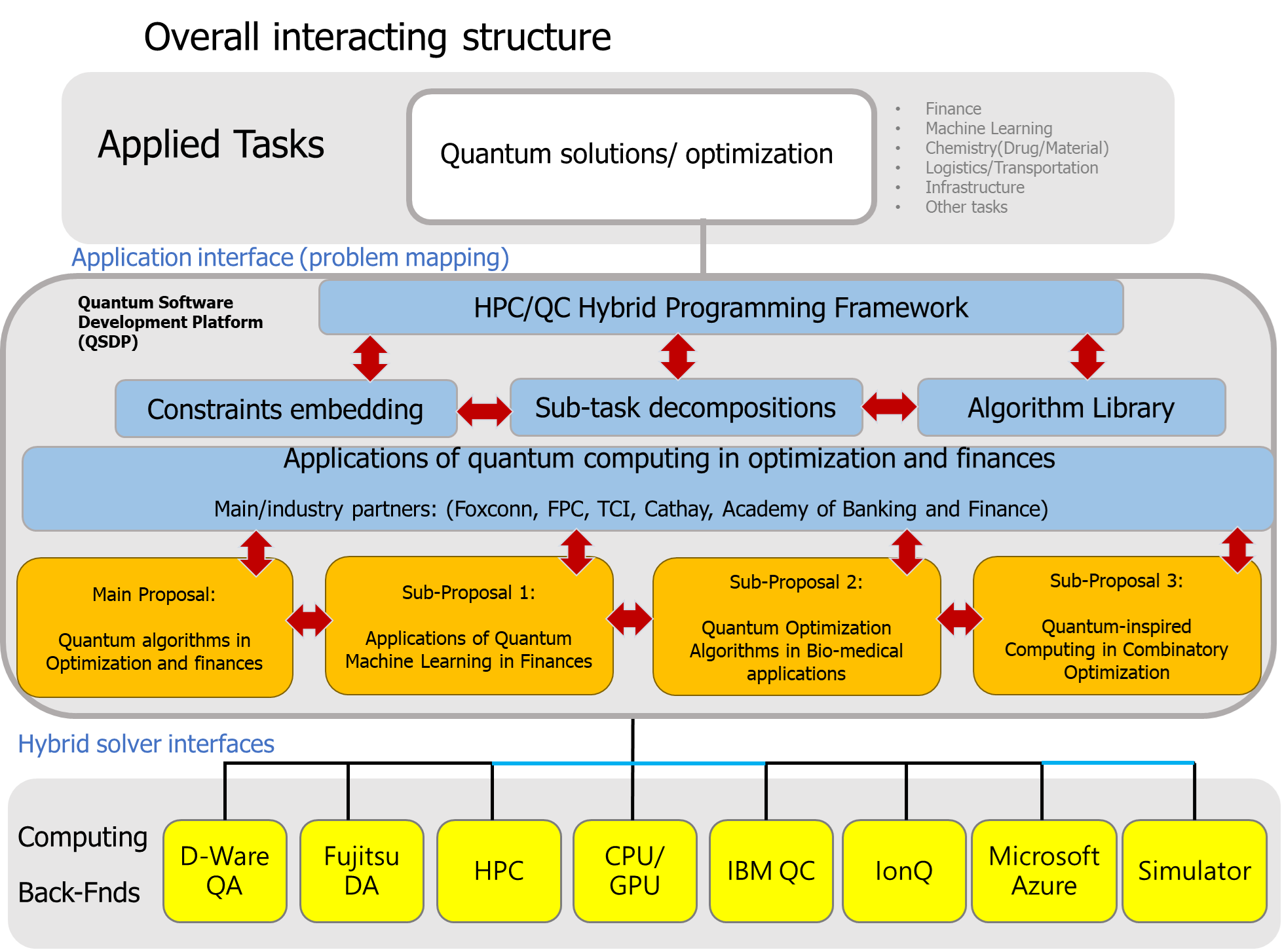
The integrated structure of project and cooperated partners. Our projects emphasize on Quantum finances, quantum drug designing, quantum material analysis, and quantum optimization and cooperate with several major industrial partners in Taiwan to study the POC problems provided by our partners.
-
Co-PI
-
Sy-Yen Kuo (National Taiwan University)
-
Chao-Sung Lai (National Yang Ming Chiao Tung University)
-
Y.Jane Tseng (National Taiwan University)
-
Shih-wei Liao (National Taiwan University)
An Application of Multi-Split-Step Quantum Walks to Financial Market Simulations
This dissertation explores the groundbreaking application of quantum computing in the finance sector, concentrating on the development and implementation of specialized quantum algorithms for complex financial simulations. Leveraging the principles of quantum mechanics—superposition, entanglement, and interference—this research integrates quantum physics with computational finance to formulate an innovative quantum algorithm. Central to our study is the multi-Split-Step Quantum Walk (multi-SSQW), which extends traditional quantum walk frameworks by incorporating multi-agent decision-making processes. This enhancement enables the sophisticated modeling of complex financial distributions and scenarios, accurately reflecting real-world market intricacies. The algorithm's notable adaptability, reliable convergence, and rapid computational capabilities make it a transformative tool for financial analysis and strategic decision-making. Beyond theoretical contributions, this research showcases practical applications, offering a significant computational advantage over traditional methods and setting a new standard for the future of financial modeling and risk assessment.
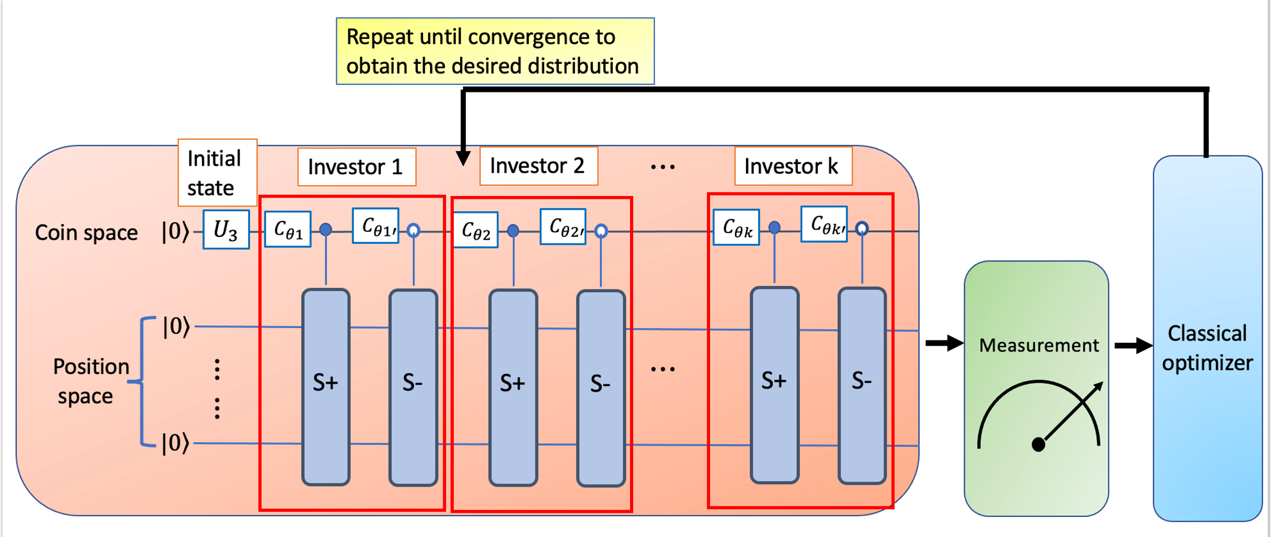
This diagram illustrates the structure of the multi-Split-Steps Quantum Walk (multi-SSQW). The overall system demonstrates how quantum walks can be combined with classical optimization techniques to be used for complex financial market simulations and decision-making analysis.
Reference: Yen-Jui Chang, Wei-Ting Wang, Hao-Yuan Chen, Shih-Wei Liao, Ching-Ray Chang. “A novel approach for quantum financial simulation and quantum state preparation.” Quantum Mach. Intell., vol. 6, no. 24, 2024.
High-performance Hybrid Quantum Computing and its Software Platform for Quantum Circuit and Financial Optimization
Quantum-inspired optimization has demonstrated superior performance compared to traditional algorithms but still faces challenges in solving complex problems. Our new technology addresses these issues by utilizing superposition encoding to prevent premature convergence, incorporating effective guidance for rapid search, combining quantum NOT gates to escape local optima, and adaptively adjusting parameters and convergence speed. It also considers variable relationships using entanglement local search, effectively searches for the optimal solution, and extends to multi-objective models, offering diverse strategies and developing a visual application interface. When applied to quantum circuit synthesis, this technology significantly reduces the number of logic gates, accelerating the development of IBM quantum computers. Additionally, we have developed an innovative trend-based financial investment model that precisely defines stable upward trends, proving its applicability in global stock markets. This model, encoded on D-Wave quantum computers, significantly reduces computation time and improves investment returns and risk management performance.
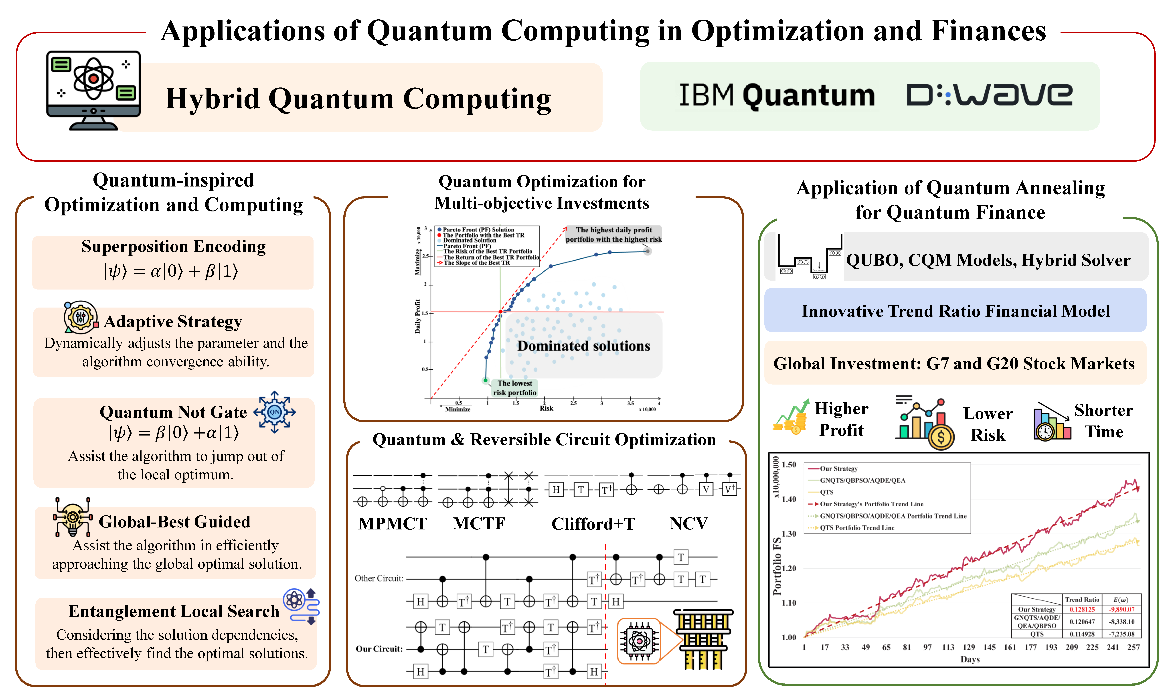
Develop high-performance hybrid quantum optimization technology to optimize quantum circuits and construct multi-objective and weighted financial investment portfolios, reducing search time, increasing returns, and lowering risk.
References:
Yao-Hsin Chou, Ching-Hsuan Wu, Pei-Shin Huang, Shu-Yu Kuo, Yu-Chi Jiang, Sy-Yen Kuo, and Ching-Ray Chang “Hybrid Quantum Annealing with Innovative Trend Ratio Model for Portfolio Optimization,” 2024 IEEE World Congress on Computational Intelligence (IEEE WCCI 2024), (Accepted for Publication), July 2024.
Yu-Chi Jiang, Yun-Ting Lai, Po-Chun Chen, Yu-Yu Chang, Kun-Min Wu, Shu-Yu Kuo, Yao-Hsin Chou, and Sy-Yen Kuo, “Quantum-Inspired Computing: Entanglement-Enhanced Technique for Short Portfolio in Global Markets,” 2023 IEEE International Conference on Nanotechnology (IEEE NANO 2023), pp. 534-538, July 2023. (Best Poster Award, First Prize)
Yao-Hsin Chou, Yu-Chi Jiang, Yi-Rui Hsu, Shu-Yu Kuo, and Sy-Yen Kuo, “A Weighted Portfolio Optimization Model Based on the Trend Ratio, Emotion Index, and ANGQTS,” IEEE Transactions on Emerging Topics in Computational Intelligence, vol.6, no. 4, pp. 867-882, August 2022.
Quantum-Inspired Computing for Natural Product Structure Elucidation
To solve the NP-complete problem of natural product structure elucidation, we transformed the combination of structures and molecular weights into Quadratic Unconstrained Binary Optimization (QUBO) formulation according to the database and target peaks. Quantum-inspired computing identified the validating structures with linear running time complexity. This study can help scientists elucidate the structures of effective compounds from natural product mixure and accelerate the progress of drug discovery.
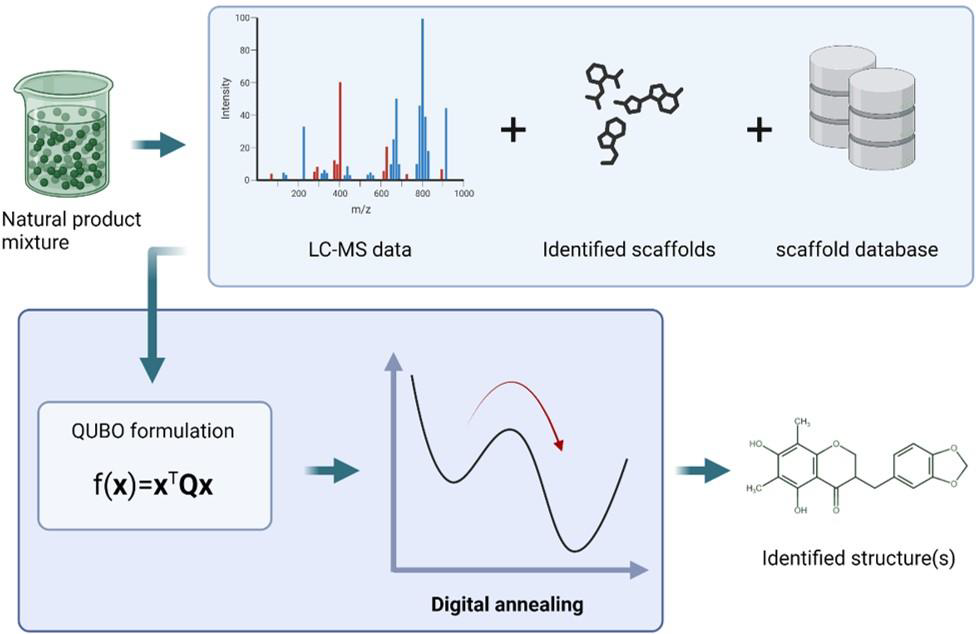
The workflow to elucidate natural product structure from MS data using quantum-inspired computing.
Reference: C Lee, PH Wang, YJ Tseng*(2023, Aug). Exploration of Quantum-Inspired Computing for Natural Product Structure Elucidation. ACS FALL 2023 National Meeting & Exposition, San Francisco, CA.
An Automated Toolchain for QUBO-based Optimization with Quantum-inspired Annealers
- Problem to be addressed:
This technology aims to develop an automated toolchain for quadratic unconstrained binary optimization (QUBO)-based quantum-inspired annealing optimization to solve combinatorial optimization problems (COP). - Importance/Breakthrough:
It helps general users who are not familiar with QUBO to utilize quantum-inspired annealers to solve common COP problems. - Relevance to the future research directions of the project:
The objective of Subproject 3 of this project is to implement a QUBO-based software development platform (QSDP) for quantum optimization. This system is crucial for achieving the goals of this project.
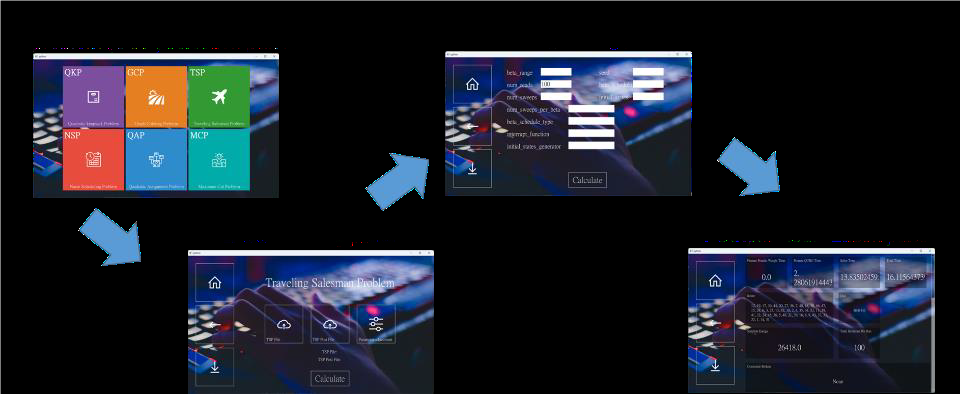
The figure shows the four panels of the user interface for the automated toolchain implementing quantum-inspired annealing optimization in this project.
Reference: Yun-Ting Zhang, Chin-Fu Nien, Chia-Wei Lin, Wen-Jui Chao, Chen-Yu Liu, Lien-Po Yu, Yuan-Ho Chen, “An Automated Toolchain for QUBO-based Optimization with Quantum-inspired Annealers,” 20th International SoC Design Conference (ISOCC), Jeju, Korea, Republic of, 2023, pp. 171-172.
